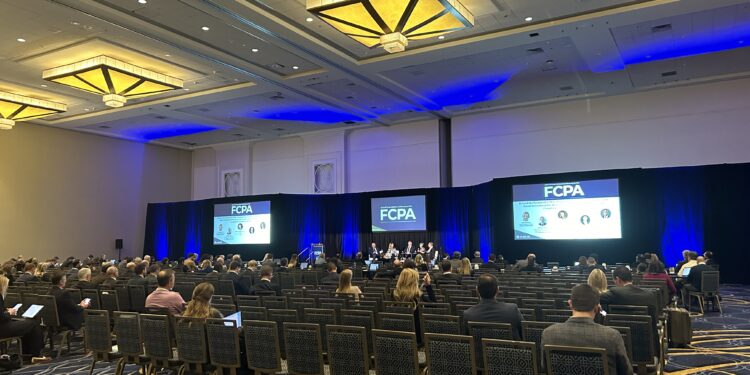The American Conference Institute (ACI) hosted its 41st annual International Conference on the Foreign Corrupt Practices Act (FCPA) in Washington, D.C., on December 4 and 5. The premier conference featured speakers from the U.S Department of Justice (DOJ), in-house counsel, defense attorneys, and other federal regulatory agencies such as the Commodity Future Trading Commission (CFTC), the Securities and Exchange Commission (SEC), and the Federal Bureau of Investigation (FBI). The two-day event featured unprecedented in-person attendance and gave a retrospective analysis of FCPA/FEPA enforcement and the financial compliance space in 2024.
This year’s conference took place following a string of federal policy changes. The session took the opportunity to acquaint legal and compliance professionals in attendance with the new Foreign Extortion Prevention Act (FEPA), new pilot programs, such as the recently launched DOJ Whistleblower Program, and recent policy changes, such as adjustments to the DOJ’s Evaluation of Corporate Compliance Programs (ECCP). In light of recent strides in AI data analytics, broader themes of innovation in investigation and enforcement tactics also saturated panels throughout the session. The conference also highlighted the significant role of international cooperation in FCPA enforcement, which reached new heights this year , enabling unseen levels of collaboration across borders. All these themes lent to 2024’s banner year of FCPA/FEPA enforcement across regulatory agencies.
The role that whistleblowers play in identifying FCPA violations was touched on consistently throughout the conference, with primary emphasis placed on encouraging internal reporting and improving good corporate citizenship. While the DOJ’s new pilot Whistleblower Program faced substantial backlash from the whistleblower community for failing to include best-practice recommendations, DOJ speakers repeatedly highlighted early signs of the efficacy of the new DOJ Whistleblower Program throughout the conference. In the session “Spotlight Interview: Department of Justice, Fraud Section,” speaker Glenn Leon, Chief of the Fraud Section, reiterated that since the pilot program’s launch in August of 2024, 250 unique tips have been received by the agency, prompting 60 active investigations.
Leon, among other DOJ representatives, made a concerted effort to reassure corporate compliance attendees of the DOJ’s equal efforts to improve complimentary Corporate Enforcement Policies (CPE). Such new policies include a 120-day grace period for corporate self-reporting following an external whistleblower disclosure, and increased leniency for Non-Prosecution Agreements (NPAs), Deferred Prosecution Agreements (DPAs) and resolutions which accommodate the nuance of corporate responses to whistleblower disclosures and FCPA investigations. The DOJ speakers’ expressions of commitment to these new policies and their belief in a shared desire for good corporate citizenship were clear, underscoring the department’s efforts to foster a cooperative relationship with the corporate sector.
The conversation around whistleblowing straddled an ideological fault line, highlighting disparate views regarding the practice between corporate compliance professionals and the broader whistleblower community. Capping off his remarks about the policies, Leon asserted a caveat to this shared faith, stating, “Make no mistake, we are not waiting by the phone for companies to self-report.”
The 41st Annual FCPA Conference offered hope for the coming year of FCPA/FEPA enforcement, promising continued year-over-year increases in investigations and successful enforcement. By prioritizing enforcement against “gatekeepers” of the field and leveraging cooperation and good faith relationships with corporations, federal agencies hope to see continued growth in the enforcement sector.


